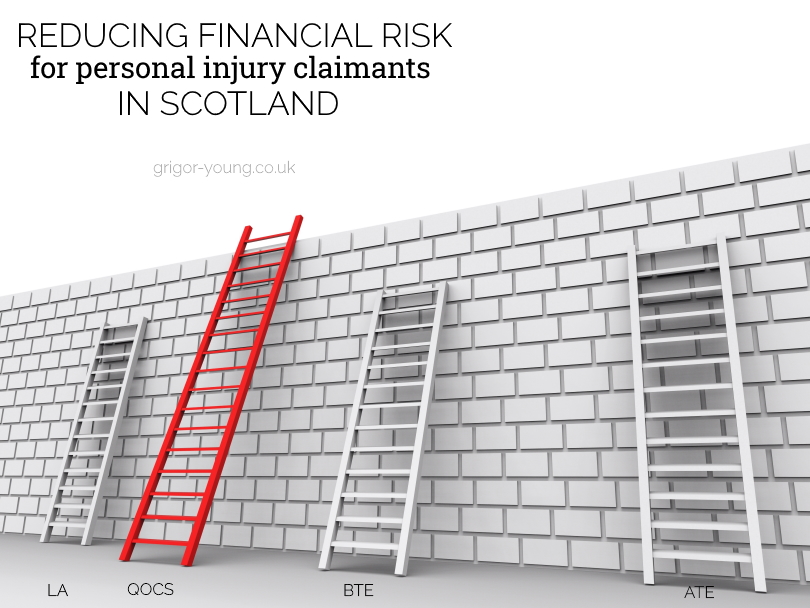
You know a bird squawks if it makes a loud, harsh noise. As in, ‘the squawking of the flock of geese overhead was deafening’.
You might know that a quark is a type of elementary particle and a fundamental constituent of matter. Quark is also a fresh dairy product a bit like yoghurt.
But have you heard of QOCS?
You pronounce it to rhyme with squawks (‘quawks’).
The letters stand for something: Qualified One-way Cost Shifting.
It’s a term which describes a change to Scots Personal Injury Law which will probably take place by Summer 2021.
The anticipated date for the change to a QOCS-based system is mid-June 2021.
By way of background, the Scottish Government wants to change how personal injury claims work.
This follows upon a similar revamp in England and Wales a few years ago.
QOCS’ main impact will be to lessen the financial risks for victims of personal injury who need to raise a court action in their quest for compensation.
Under the present system, if you cannot negotiate a settlement of your claim and you have to raise court proceedings, the risk your claim might fail is a concern for you in terms of potential costs.
If you lose the court action, the court will almost certainly find you responsible to pay the other side’s court costs. It’s not enough if your own solicitor is acting no win-no fee and you won’t have to pay him or her if your claim fails; you’ll still have the other side’s legal expenses to contend with.
Under the current costs regime, the risk of having to pay the other side’s legal costs can be eliminated through various “insurance” products (e.g. Before the Event Insurance, Legal Aid, and After the Event Insurance).
But, under the new QOCS system, the qualified one-way cost-shifting will reduce the need for insurance – or at least the level/cost of insurance – for personal injury claimants.
QOCs affects money you might otherwise have to pay out if your claim fails.
With QOCS, if your claim goes to court and you’re successful, you still get your legal costs (in addition to your compensation) from the other side (usually, an insurance company). If your claim fails, on the other hand, the other side will not have any claim for legal expenses against you.
In those terms, the cost shifting is indeed “one-way”. It benefits you, the injured person claiming compensation, but not the opponent.
What’s the effect of the word “qualified” in qualified one-way cost-shifting?
One qualification or exception is that QOCS will only apply to personal injury claims.
Another exception is that the injured person will lose their insulation from a costs award against them if they have been “fundamentally dishonest” in relation to their claim.
The definition of what constitutes fundamental dishonesty in Scotland is not finally worked out yet but we can get some insight from what has happened in England and Wales.
At the most extreme level, fundamental dishonesty will apply to a situation where the injured person has invented their accident or injury. But it will probably apply to less fundamental dishonesty too.
Let’s look at fundamental dishonesty in practice…
One example from England involved a genuinely-injured claimant who fabricated a claim for gardening costs by making up invoices they had supposedly been charged for getting someone else to do their garden for them because they were no longer fit enough.
Though the gardening-costs element of the claim was only 28% of the claim as a whole, nevertheless, the dishonesty was held to be fundamental. They received no compensation at all.
They also lost their protection against having to pay the legal costs of the other side. All-in-all, a disastrous outcome.
As you can see, one-way cost-shifting is ‘qualified’ in that it does not apply in all circumstances.
Most importantly, QOCS will not help you where your claim has some significant element of dishonesty included within it.
Our understanding from the Scottish Legal Aid Board is that QOCS will not affect the availability in Scotland of legal aid for personal injury claims (it is available and will remain available). It will otherwise still be necessary to insure against the risk of adverse costs (e.g. BTE or ATE insurance) but the premiums should be lower because the risk to the legal expenses insurer will be much lower than under the present system.
Summary
The underlying purpose of a QOCS-based system is to protect those who suffer injuries from the risk of having to pay the other side’s costs if the compensation claim fails.
Such a one-sided system can be justified because the party on the other side is generally an insurance company, which has vast resources and huge claims experience compared to the injured person.
As with all one-way systems, it’s important to understand which way is the “one way”.
[My first day as a detective]
Me: It’s one way glass he can’t see you. Just point at the killer.
Witness: All I can see is our reflection.
Me: Ah, ok. Everybody swap rooms.— Paul (@bingowings14) May 5, 2018
How we can help
We hope you’ve found this article – about a forthcoming change in Scots Law which will reduce financial risk for personal injury claimants in Scotland – to be helpful.
If you have any questions at all, please do not hesitate to contact us. You can phone us on 01343 544077 or you can send us a Free Online Enquiry via this website.
More information is available on our Moray Claims website about the proposed changes to the law discussed in this article and also regarding funding methods for personal injury compensation claims, generally.

 When can you speed up the registration of a Power of Attorney?
When can you speed up the registration of a Power of Attorney?